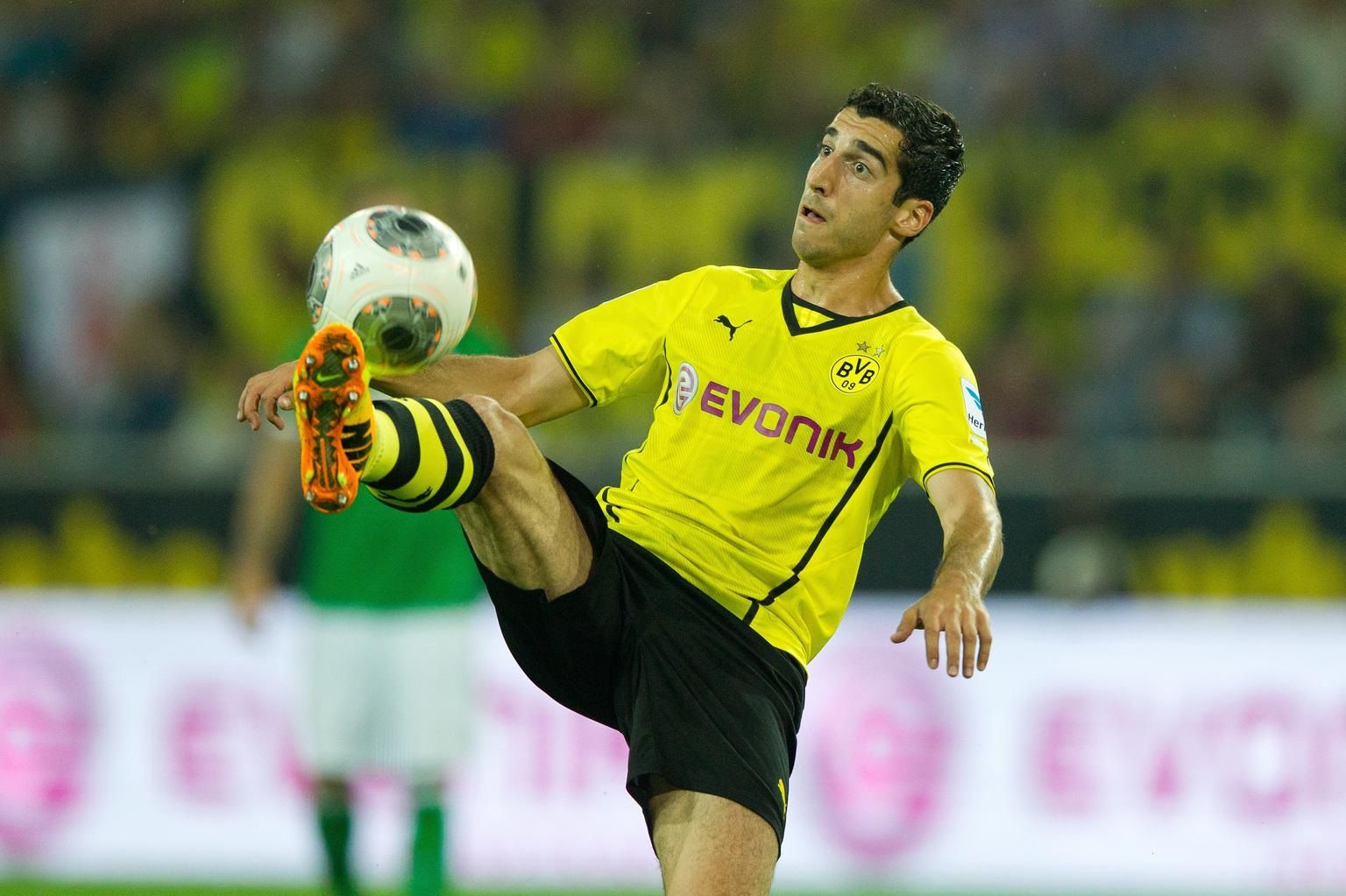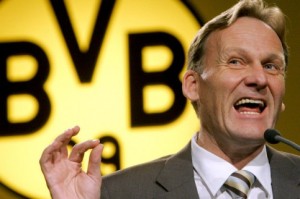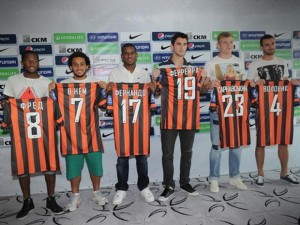By Manuel Veth –
Borussia Dortmund’s CEO Hans Joachim Watzke was visibly exhausted upon his return from Donetsk after he completed the signing of Armenian attacking midfielder Henrikh Mkhitaryan in July 2013, admitting: “This was clearly a very difficult transfer, but we really wanted to make this happen”. Mkhitaryan was brought from Ukraine’s Shakhtar Donetsk to Borussia Dortmund in the summer of 2013 and the Yerevan-born man has since become one of the most revered talents in the German Bundesliga.
The case of Mkhitaryan, and the role of his club Shakhtar Donetsk, is one of the most high-profile case studies of increasingly common third-party ownership arrangements in European football despite third-party ownership having been banned in the English Premier League since 2007, and coming under heavy criticism from UEFA, FIFA and the players’ union FIFpro.
Mkhitaryan had not been short of suitors before moving to the Ruhr. Indeed, for most of the summer of 2013 Liverpool headed the chase to successfully negotiate a deal with his Ukrainian employers.
However, the Armenian’s situation was complicated as later revealed in the German newspaper Die Sueddeutsche, which indicated that Mkhitaryan’s contract had multiple owners, something that might have deterred Liverpool’s plans to sign the top scorer of the 2012-13 Ukrainian Premier League season.
Perhaps it was due to the English club’s unease with such opaque arrangements, although several sources indicate that Mkhitaryan was never really interested in a move to Anfield.
Where others have encountered difficulties, Bundesliga teams have been adept at signing players from the former Soviet Union due to their ability to navigate more cleanly through, and indeed tolerate, the third-party ownership process. At times, the Bundesliga has had a somewhat murky relationship when it comes to third-party ownership: Of note, players such as Rafael van der Vaart (from Tottenham Hotspur to Hamburger SV) and Lukas Podolski (from Bayern to Cologne) were financed through third parties and although this practice has its detractors in Germany, it is strictly speaking legal.
Mkhitaryan’s Defection to Germany – Taking the Micki?
Perhaps under those circumstances it is no surprise that Micki, as he is now affectionately called in Dortmund, ended up in the Bundesliga. Yet the path to Dortmund was more akin to a winding Caucasus mountain track than the Autobahn.
In June 2013, Ruben Hayrapetyan, an Armenian multi-billionaire, owner of a business empire that includes the Armenian football club Pyunik Yerevan, a former member of the Armenian parliament, and president of the Armenian Football Federation, indicated in an interview with the Armenian sports service Armsport, that Shakhtar Donetsk only held half of the transfer rights to Mkhitaryan’s contract. The other fifty percent was split between the Armenian talisman’s former clubs Metalurh Donetsk and Pyunik.
Amid this entangled arrangement and with various snouts in the trough, Mkhitaryan fled from Donetsk to Vienna at the end of the 2012-2013 season, declaring he would never return to Ukraine. This reluctance was motivated by the joint position of Rinat Akhmetov (Shakhtar’s owner), Sergei Taruta (the owner of Metalurh and another Ukrainian oligarch) and Hayrapetyan, all of whom wanted to sell Mkhitaryan to Dagestan’s then free-spending Anzhi Makhachkala for €35 million.
Mkhitaryan responded by hiring the Italian football agent Mino Raiola, famed for his powers of negotiation and an ability to make seemingly impossible transfers materialise. Mkhitaryan could also rely on the support of his mother Marina Tashchyan (director of the Armenian national football team) and his sister Monika (an assistant to UEFA President Michel Platini), with both women using their influence in their respective positions to convince Hayrapetyan not to interfere with the Armenian’s dream move to Western Europe.
The prolonged Mkhitaryan defection to Dortmund revealed much about the interwoven practice of multi-player ownership and the high number of actors who were involved, all of which is very common in the Ukrainian Premier League and Shakhtar Donetsk in particular.
The Secret Agents of Third-Party Ownership
Third-party ownership in Ukraine and elsewhere in Europe is not, it should be expressly noted, exclusive to players from the post-Soviet space. In Ukraine, for instance, numerous South American players are owned by their clubs under cloudy contractual conditions in which, naturally, player agents play a central role.
The Brazilian Willian, who now plays for Chelsea, was also part of a similar arrangement to that of Mkhitaryan. In the summer of 2012, Willian indicated that he was ready to leave Shakhtar, with Akhmetov initially unwilling to accommodate the Brazilian’s wishes. During the winter break of the Ukrainian Premier League, however, rumours circulated that the player would move to Chelsea.
Instead, Anzhi Makhachkala, owned by the then billionaire Suleyman Kerimov, dropped £35 million to lure him to the Dagestani side.
For Chelsea, any feelings of neglect were short-lived as Anzhi’s dramatic down-sizing in the summer of 2013 saw its high earners depart, including Willian who declined an offer from Tottenham Hotspur to join Roman Abramovich’s West London club.
Tottenham had the deal all but secured when Abramovich directly intervened by using his connections with both Willian’s agent Kia Joorabchian and Anzhi owner Kerimov to get the deal done. Indeed Chelsea, and their owner Abramovich, seem to have strong links with several agents, with allegations being muttered that they have several players lined up under third-ownership deals at the Portuguese club Sporting Lisbon.
Like most of Shakhtar’s significant Brazilian contingent, Willian was managed by the infamous Iranian-Canadian sports agent Joorabchian, who brokered the final deal between Chelsea and Anzhi. Joorabchian was the controversial figure behind the deals that brought Carlos Tevez and Javier Mascherano from Argentina to Corinthians of Sao Paulo in Brazil, and later to West Ham United in the Premier League.
Joorabchian has heavily defended the model of third-party ownership, and sees it as a way of helping South American players, and Brazilians in particular, to find a secure footing in European football. In the past, Joorabchian and his player agency MSI had heavily invested in post-Soviet football and in CSKA Moscow, and Dinamo Moscow in particular. It now appears that his sphere of influence has widened to encompass Ukrainian football with Shakhtar Donetsk his main priority in this relatively frontier market.
Joorabchian’s (Thus Far) Failed Takeover
As part of their series on third-party ownership in football, the Guardian revealed that Eastern Europe is a haven for such arrangements with the case of Mkhitaryan a striking example of this phenomenon. But as the Ukrainian journalist Aleksandr Tkach explains, these contracts are common among Shakhtar’s Brazilians and other foreign players in the league, but seldom is this practice applied in the case of Ukrainians.
Shakhtar’s all-but-guaranteed annual participation in the Champions League, and Ukraine’s fairly competitive league, as well as one of Europe’s most modern training facilities, staffed with excellent coaches, has made the Donbass club the ideal point of entry for young talented South American football players who seek to make their mark in European football.
In addition, Mircea Lucescu, the legendary coach of Shakhtar has become a footballing mixologist, combining the South American flair of Argentinians and Brazilians, with the more robust playing style of Ukrainians. This has made him one of the most successful coaches in Europe, and Shakhtar the only real super club of the former Soviet Union.
Shakhtar, despite the extensive resources of their owner Rinat Akhmetov, have been somewhat dependent on Joorabchian’s ability to bring in talent from South America.
After all, the club has benefitted from the many talented Brazilians that Joorabchian has brought to the Donbass, but worryingly the extent of the agent’s power appeared almost boundless this summer when several South American players refused to return to Ukraine.
As was widely reported, the Donbass region has seen heavy fighting in recent months in Ukraine’s conflict with pro-Russia separatists, and in July six players (five Brazilians including the international Bernard, and one Argentinian) initially refused to return to Ukraine in July after a friendly in France, citing security concerns and the deteriorating political situation. Lucescu detected opportunism and blamed Joorabchian for manipulating the difficult situation in Ukraine to force Shakhtar to sell the players below market value to clubs in the West. Akhmetov promised that he would not sell any of the players, even if it meant them idly sitting out the remainder of their contracts.
Eventually, the mutiny subsided and all players returned to Shakhtar, and have been taking part in the current season. While Shakhtar remains in a difficult situation, being forced to train in Kiev and play ‘home’ matches over 1,000km away in Lviv in Western Ukraine, they at least seem to have brought some control to their relationship with the influential player agent.
Shakhtar, after all, are very dependent on the services of the Canadian-Iranian as it is through his network that the club had been able to bring in high calibre players from South America. The relationship between Shakhtar and Joorabchian is therefore an essential building block that supports the theory behind the ‘Shakhtar Code‘, which sees the club, alongside Porto, as the most popular “stepping stone” for South American talent to reach mainstream European football. As such, it appears that for Shakhtar to become the most powerful club in the former Soviet Union, an unsavoury pact was a necessary evil.
Manuel Veth is the owner and Editor in Chief of the Futbolgrad Network. He also works as a freelance journalist and social media editor at Bundesliga.com. He holds a Doctorate of Philosophy in History from King’s College London, and his thesis is titled: “Selling the People’s Game: Football’s transition from Communism to Capitalism in the Soviet Union and its Successor States,” which will be available in print soon. Originally from Munich, Manuel has lived in Amsterdam, Kyiv, Moscow, Tbilisi, London, and currently is located in Victoria BC, Canada. Follow Manuel on Twitter @ManuelVeth.























COMMENTS